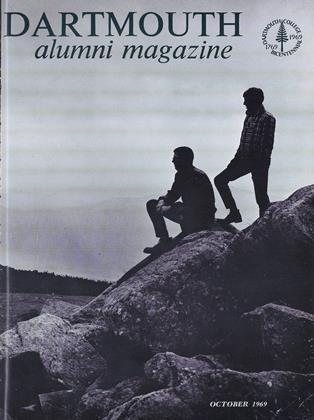The College Committee on Standing and Conduct, which recessed over the summer after hearing three-fourths of the cases of students charged with forcibly seizing and occupying Parkhurst Hall last May, reconvened on September 8 and in four days disposed of the remaining ten cases. The Committee had completed 29 cases in two weeks of hearings in late May and June.
Four of the September cases were open to the public at the request of the students involved, all of whom were represented by Attorney Kenneth A. Mac Donald '39 of Seattle, Wash. In these cases, the Committee separated David H. Green '71 of Baltimore, Md.; suspended Neville K. Mody '69 of Fort Bombay, India, for one year; and placed Guy Brandenburg '71 of Washington, D. C., and William Geller '71 of Hewlett, N. Y., on college discipline with restrictions for the current academic year.
The other six cases were heard in closed sessions and only a summary of the decisions, without names, was disclosed. Two students received three terms of college discipline with two terms of restrictions, three received two terms with restrictions, and one received one term with restrictions.
In summary, of the 40 Dartmouth students charged with violating the Policy on Freedom of Expression and Dissent by participating in the Parkhurst Hall occupation, one student was separated, two were suspended for an academic year, four were suspended but reinstated in time to graduate in June, 27 received college discipline with restrictions for periods of from one to three terms, five were acquitted, and one withdrew from college without a hearing.
Two Faculty Members Suspended
In a separate hearing, the Faculty Committee Advisory to the President took up the cases of Paul S. Knapp, Visiting Assistant Professor of Chemistry, and Dona P. Strauss, Assistant Professor of Mathematics, who were charged with participating in the Parkhurst Hall takeover. The Trustees, in early August, voted to suspend both for two years, as recommended by CAP, which found that the two faculty members had violated both the Policy on Freedom of Expression and Dissent and the unwritten principles upholding academic freedom and governing institutions of higher learning.
Mr. Knapp, who was at Dartmouth on a one-year appointment, was authorized to complete a chemistry course he was offering during the first part of the summer term. Mrs. Strauss, who had been given a three-year reappointment, beginning July 1, 1969, will not be permitted to return to the faculty until July 1, 1971. She is currently in England where she has accepted a teaching assignment.
Services Announce ROTC Closings
Actions over the summer also involved ROTC, which was the point of contention in May's student uprising. The Department of the Air Force announced that its ROTC unit at Dartmouth would be withdrawn at the end of June 1971, thus enabling juniors to complete the two-year program for which they had enrolled last year. Shortly after, the Army gave the required 12-months notice that it would close out its unit at Dartmouth in the summer of 1970. Juniors will be enabled to double up in Army courses this year and get commissions when they graduate in 1971. Sophomores will be able to complete the Army's two-year basic course, but will have to transfer elsewhere if they want the final two years of advanced training. (Dartmouth will offer financial help to those Army ROTC scholarship men who remain at Dartmouth and demonstrate need.) No freshmen are enrolled in Army ROTC this year. The Navy has indicated that it will honor its commitments to all Dartmouth students enrolled, including the 28 freshmen who entered the fouryear Navy ROTC program this fall.
 View Full Issue
View Full Issue
More From This Issue
-
 Feature
FeatureThird Century Fund Launches General Campaign Among Alumni
October 1969 -
 Feature
FeatureThe Transcending Great Issues
October 1969 -
 Feature
FeatureA Scientific Centennial for Dartmouth
October 1969 By ALLEN L. KING -
 Feature
FeatureWhitewater Racing Gains New Status
October 1969 By JAY EVANS '49 -
 Feature
FeatureBicentennial Draws Unusual Gifts
October 1969 -
 Article
ArticleWith the Big Green Teams
October 1969







